


An amazing little game! While it comes in the guise of a city-builder and the story revolves around constructing the titular Technotopia, it's actually a puzzle game. As you draw cards, you place tiles of one of four colours, arrange them into specific shapes and get points for the equivalent colour. The goal is to always have enough points for all four colours at the end of a week, otherwise the game ends. This becomes more difficult and - eventually - impossible, as the number of points you need to reach increases each week. Basically, you need to survive as long as possible, then start over. To help with that, you can unlock new and more powerful cards that synergize with each other to generate more points. Additionally, there are special projects (which usually means surrounding a structure with tiles) that grant additional boosts or drive the story along. Lastly, there are semi-randomized mini events that also affect your points, often over several weeks. With the way the game works, you can't simply follow your own values in these events, but need to think about the balance of points for the end of the week. The game features rogue-lite elements, so new cards you've unlocked and main story progression that you've made will persist as the game starts over repeatedly. Speaking of which, both the main story and the mini events are quite compelling and often feature some dark humour. The graphics are beautiful and stylized; the music is chill, unobstrusive, and fitting. The only issue I see is with the length of the main story - I finished it in literally one evening. But firstly, the game is incredibly cheap for what is provided, and secondly you can always keep playing after the main story finishes, to unlock more cards, achievements, or simply to see how long you can survive. Highly recommended, it's a great deal.
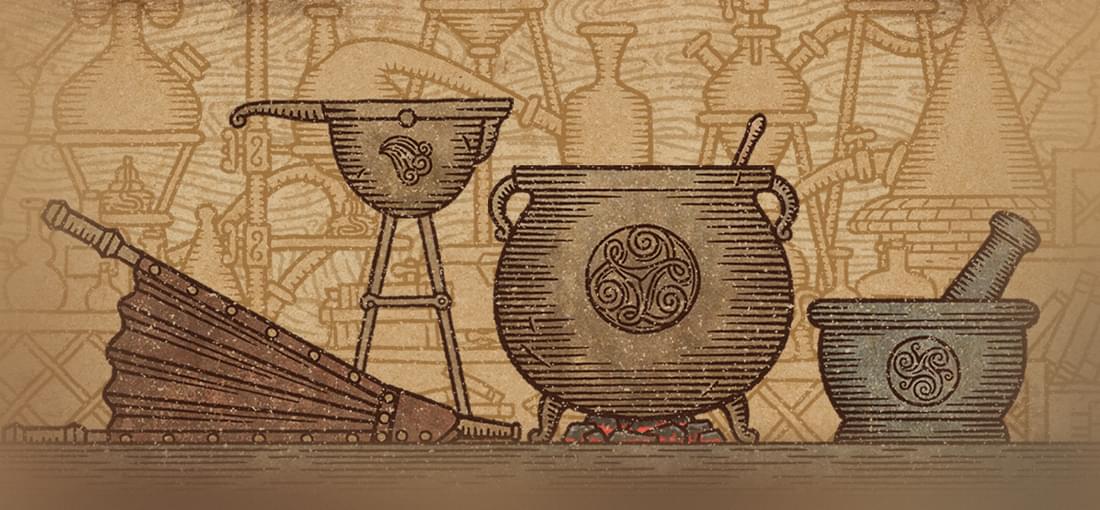
This is a puzzle game wherein you use ingredients as the "directions" and "steps" to explore and traverse the alchemy "map", for brewing your potions. You will need to avoid obstacles, lest your brewing attempt fail. Each ingredient represents a different, sometimes quite wild movement pattern. On top of that, grinding the ingredients up, diluting the potion, using special abilities from salts etc. are all ways to manipulate how you move. There are three "maps" to explore, each with slightly different rules to learn. To get ingredients, you need to either grow them in your garden (requiring the proper seeds first) or buy the more exotic ones from traders, until you can get the respective seed; expanding the ways you can move on the "maps" is a major aspect of progression, along with exploring them. You can buy ingredients, seeds, and other things from specialist traders, who will only show up every couple of days, though, so some patience is required: It was rather annoying when I thought I had everything I needed to progress, only to have to wait for a specific trader to show up to expand my garden or buy a missing recipe. Another big part of the game is selling the potions, of course. A set number of customers appear each day and ask about getting a potion for a need they have. You offer them a potion that will fit their need, although a lot of the times there is more than one correct answer. This gets more complicated, as they start requiring more difficult potion effects (which you may not have discovered yet), combinations of effects, or when they want/hate a specific ingredient, and similar demands. Most customers are seemingly randomized, while a few are individuals with their own sprite and short story-line, who will show up repeatedly over the course of the game. Along the way, you will need to brew some very complex recipes, which you can save for mass production, assuming you have the space for the recipes in your recipe book: This book is essential for fulfilling your customers' needs, since it will allow you to repeatedly mass-produce potions that you already mastered. The game is technically endless, but there is a long quest-line which guides your progression, and which was my main motivation for playing. Near the end of the quest-line, this can get quite grindy, though: After brewing the final, quite complex recipe of the quest-line, I still had to spend a few days serving customers, just to increase my popularity enough to finish the final quest: What an anti-climax. The graphical style of the game is lovely and the variety of ingredients is staggering. The music fits very well, but the small number of tracks can get rather grating. There are some silly references to other games and a number of jokes, but they don't pop up too often. Sadly, the game crashed repeatedly for me. There is an auto-save at the start of every day, but since each day can be very, very long, I strongly recommend saving manually quite often, to avoid losing progress. Overall, a very stylish, cute puzzle game. The mixed-in mini-games - like haggling, tending your garden, decorating your house etc. - work well to vary things up. It does get a bit monotonous towards the end, though.
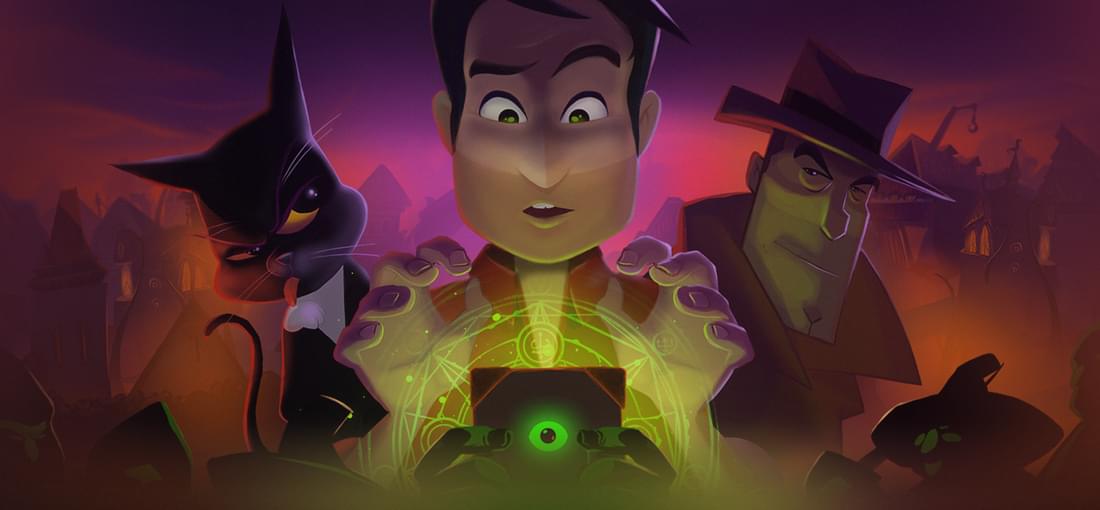
Firstly, the good: The visual presentation of this game is great, especially the varied and colourful backgrounds. The characters are less detailed, but still quite expressive. As you progress through the game, there are some short-cuts taken (like not animating some character movements or not having proper scene transitions), but I loved the hand-drawn style, all in all. However, the beginning of the game was genuinely painful. I found myself cringing away from the screen with the endless barrage of references and jokes, all of them falling flat, eliciting a groan at best. I nearly stopped playing, that's how bad it was. Thankfully, they tone it down drastically from the second town onward, and a few of the later jokes and situations actually got a chuckle out of me. Basically, though, this game lacks the kind of timeless humour that adventures like the old Monkey Island games are known for. Still, it got better as it got less obtrusive. But what didn't get better throughout the game was the overall plot and the characters' motivations; it did seem unfinished, and ends on a cliff-hanger. As for the puzzles and inventory management: These were usually relatively simple puzzles. The inventory never grows beyond a handful of items at a time - and if worse comes to worst, just use the time-honoured tradition of combining anything with everything. And while features like asking our Kitteh-companion to do things for us, or of looking into the past with our eldritch ability, weren't used to their full potential, I did appreciate the added variety. Overall: Fairly simple adventure game with a beautiful art style and a disjointed plot. An alright effort, but not great - assuming you can make it through the rocky beginning and jokes.
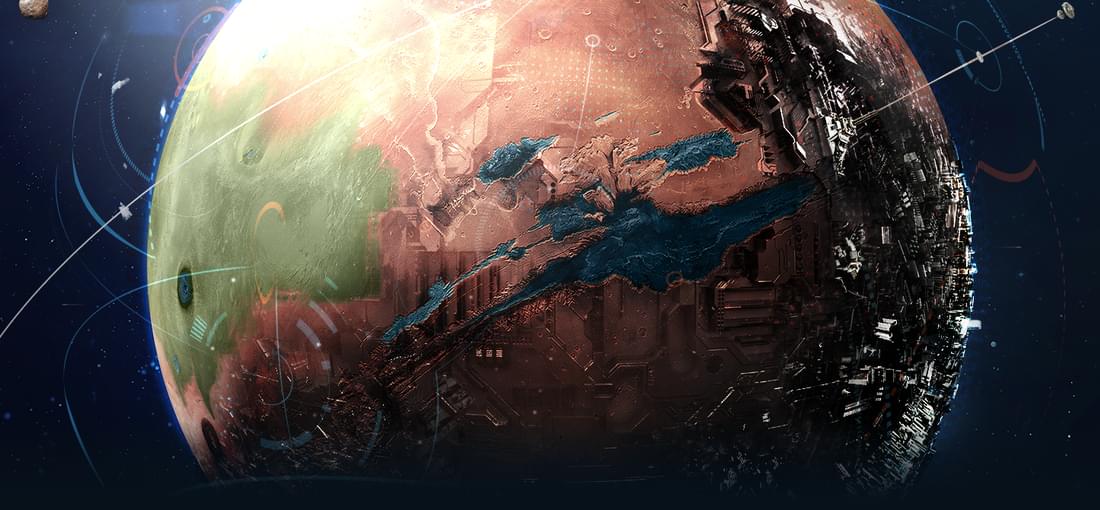
I had a lot of fun with the campaign, playing as a sentient AI terraforming mars. Unlike in Surviving Mars, the game takes place on a planetary scale, as you unlock more sectors and spread your base across the continents like some giant mechanical amoeba. The effortless zoom (from individual buildings all the way up to a planetary view) reminded me a lot of Supreme Commander, although this game is (mostly) peaceful. There are a number of basic and processed resources to keep track of: You need to balance a lot things to both keep your economy going strong - and to prevent problems with your terraforming: There are some dangers (like letting the percentage of oxygen get too high, causing fires and damage to your buildings), while other stats (like temperature) will slowly go back down if you don't keep up the terraforming efforts. Speaking of which, most of these are special projects that require (at times absurdly high) resource payments, potentially taxing your economy and slowing down expansion. Balancing your resource needs to keep things running is the core gameplay. The colonists you take care of are (unlike in Surviving Mars, with their individual desires and quirks) also basically just a resource: Due to the large scale, the humans only need food, water, and power. If they have those, they will work on researching new technologies for you. If they are unhappy, they will head back to Earth. In practice, they are just a number that goes up or down, depending on how well you manage resource flow. The story, though, is very enjoyable, as you not only discover more about your own origins as an AI, but also navigate a post-collapse political climate back on Earth and a strange remnant threat on Mars. It's very well voice-acted, giving life to an otherwise very impersonal experience. There are three endings (based on a choice late in the campaign; just make a save beforehand) and numerous achievements, but not a lot of randomization, somewhat limiting replayability.
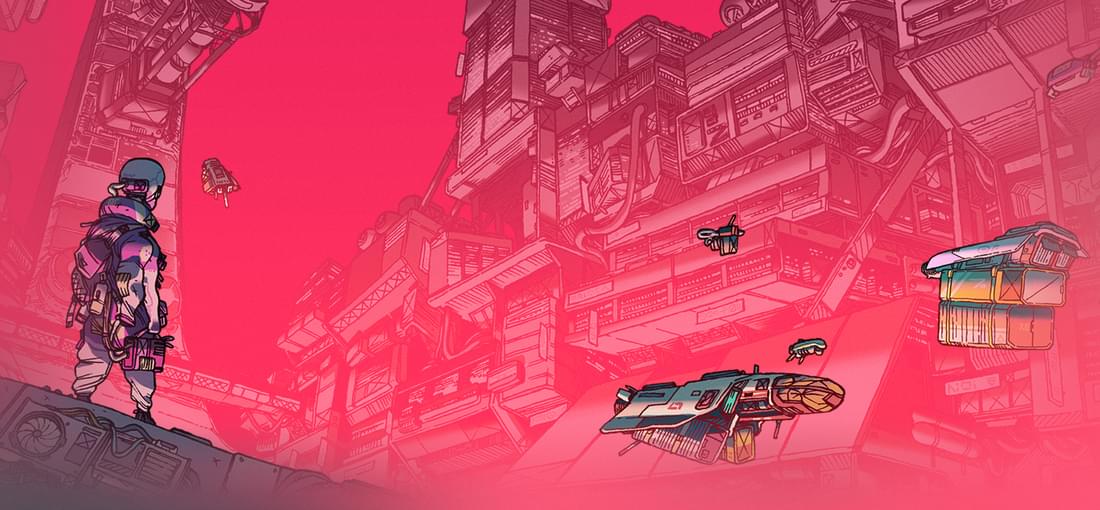
I'd call this a text-adventure with role-playing elements. It features serviceable 3D-graphics for the environment of The Eye and beautiful 2D-artwork for the characters. The music and ambience are very good as well, although the track variety seems limited. Where the game utterly shines is the writing: The interactions with the large cast of characters are beautifully done and the world-building of a post-collapse fringe society, still strongly influenced by the powerful core worlds, hangs over everything. But what really got to me were the personal stories we take part in: From a gruff street food vendor with a dark past, to a down-on-his-luck assassin hunting you down or a biologist turned guru; these characters varied greatly, from likeable to really frustrating... but always believable as people. I only wish the person cutting stacks of onions while I was talking to the dad and his adorable adopted daughter had stopped doing that a little sooner. In terms of gameplay, you visit distinct places that you can interact with: Pay money for food. Work a job to gain money or influence with a group. Do something to move character stories or plot along. These interactions require either items (like money) or one of the dice you get each morning: The number of dice you get depends on your health, so the healthier you are, the more work you can do before having to rest. Resting moves time along. But you are free to do as much as you want (or can) on each day, no hurry. You need to keep track of your needs (food & health, both decline constantly and potentially when you fail an interaction), which can be quite stressful at the start, but gets a bit too easy in the endgame. Some events are timed by days, moving along whether you're ready or not: I failed a few quests this way, but never lost the game because of it. Instead, the story moves along, with all of the consequences of your actions or inaction. Overall, this was a wonderful experience. But be ready to read a lot.
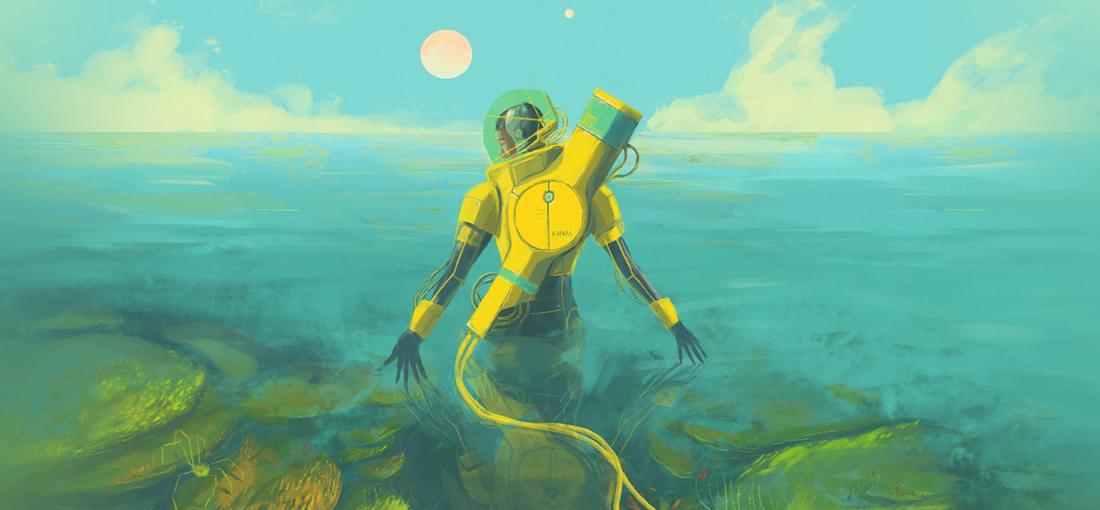
As you can tell from the screenshots, the graphics of this game are minimalist. Don't be fooled, though: It creates a very strong atmosphere regardless, using different colors and shades, as well as animations of the basic symbols which represent the various creatures of this alien ocean. More importantly, the game is highly effective in using its sound effects, ambience and soundtrack to draw the player in. I would separate the game into two major parts: The surveying of the alien lifeforms versus the main plot. If you truly want to immerse yourself in this world, you'll need to do a lot of reading on the various creatures encountered and analyzed. While each creature comes with an unlockable sketch, your own imagination is absolute key here. Meanwhile, the main plot is intriguing, but primarily serves to move the exploration of new biomes and lifeforms forward, as you visit different parts of the ocean to uncover what exactly happened to the ecosystem before your arrival. Lastly, the gameplay itself I would describe as an exploration/light puzzle game, with some resource management: There's no free movement through the ocean, but pre-defined and often branching paths. As you move from point to point along these paths, you slowly explore the current sector. You need to collect numerous different samples, which are both needed to unlock the detailed analyses of the lifeforms and to keep exploring: Sometimes, the path to the next point in line is blocked by an obstacle which can be temporarily overcome with a specific sample. Sometimes the environment drains your oxygen or your batteries quickly, which forces you to consume an appropriate sample to restore the respective supply. While this is serviceable, the gameplay is neither particularly complex nor interesting, but it does help to give each biome its own distinctive challenges to overcome, varies things up a bit and contributes to the feeling of exploring an alien world. Great atmosphere - and a very fair price!
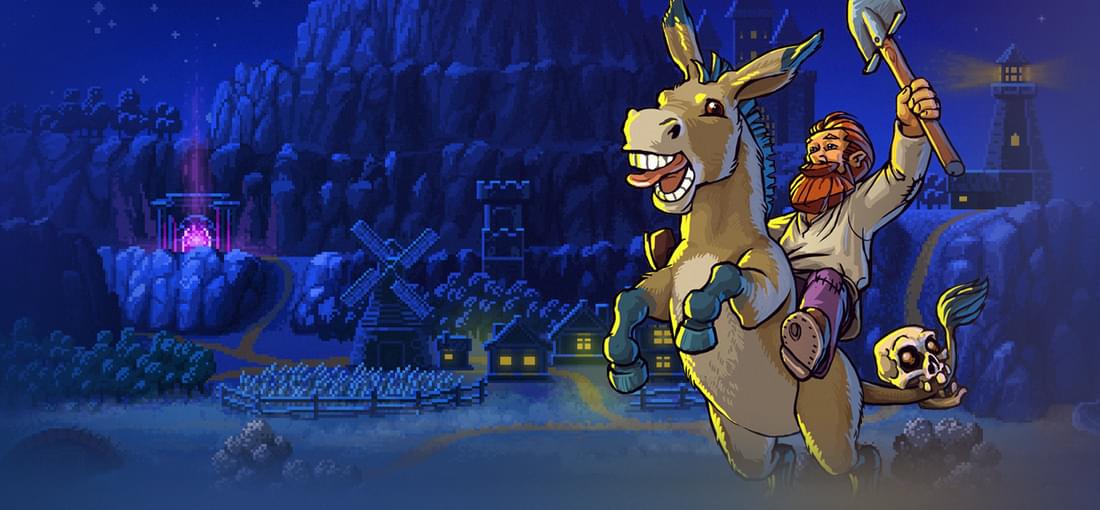
Be aware: I only played this game with all the DLC installed, which include major gameplay features. The game is very enjoyable, thanks to its beautiful pixel art, nice soundscape, the characters and their mysteries, as well as a dash of humor. There's some truly disturbing stuff going on here, if you think about it too much, so I'd recommend that don't. The main gameplay is a lot of fun and quite addictive, with a ton of variety in how to run your graveyard/farm/vineyard/tavern/quarry/church/secret laboratory/refugee camp: There's always a ton to do and there are so many options, sometimes it can get downright overwhelming. Thankfully, there don't really seem to be any timed failure states, so you can always come back to a particular project later. That huge variety is a large part of the appeal, of course. You should bear in mind, though, that a lot of the interaction basically boils down to holding down a button while at a workstation of some kind. Also, the entire thing is a grindfest by design: Expect most quests to be about delivering more and more complex and pricier goods. Usually, there's some funny dialogue or story tidbits thrown in, though. Some mechanics (like item quality or fishing) can be a bit confusing at first and aren't properly explained. Worse, nobody tells you what workstation particular items are created at, which can lead to a lot of searching around. It would also be a great help if there was a way to see what ingredients are needed for crafting, outside of the appropriate workstation (in the tech-tree or a journal or something): Too often did I walk up to a workstation, only to realize I didn't bring the right ingredients. Buy a teleportation stone to avoid tons of walking around, by the way. I suffered no crashes and I only really noticed one bug, where the black bars of a cutscene persisted into gameplay afterwards; restarting the game fixed it, though. Overall, a fun experience, but lots of grinding; which is expected in the genre.
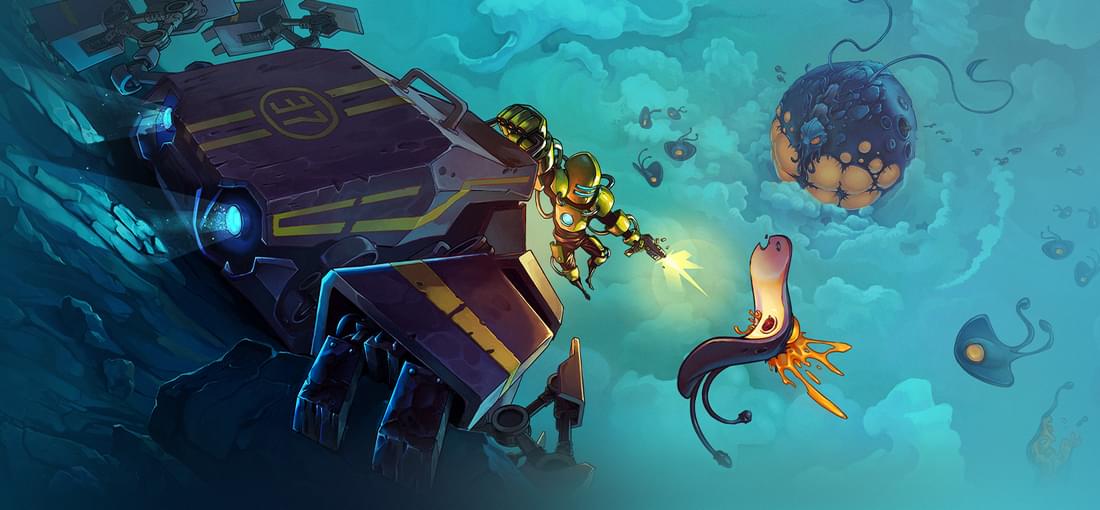
The eponymous setting is what drew me to this game: A vertical, post-apocalyptic world, wherein a band of scavengers and miners try to survive against an onslaught of monsters, using the resources and technology embedded in the wall. There's a lot of mystery about these ruins, with the characters barely comprehending the ancient tech they find. Don't get me wrong: This is a very arcade-like game, but there are interesting hints dropped regarding the backstory of this world. Also, the beautiful pixel art and great OST add a lot! The actual gameplay is split into two major parts: Crawling along the wall with your spider while being hounded by monsters, looking for mine shafts to dig into. Then there's the actual mining, which features no combat, but is always played against the clock, as the countdown to another attack on your spider ticks lower. You're also on an overarching timer, as a boss monster will attack and eventually destroy you, so you better be quick about your business. The rogue-lite permanent progression is based on points collected from breaking any blocks in the mines, so having a high clearing rate is important. The actual resources collected in the mine are used to upgrade your equipment for the current run. I have some minor quibbles: The main game's boss final stage is not a real fight, but solely depends on collecting macguffins. Once that boss is beaten, there's no ending to any future runs you do (forcing you to quit manually once you're done); strangely enough, the DLC (get that one, too!) does the inverse and replays the same cut-scene after each successful run. Some late-game areas are extremely slow to mine out, unless you got the right equipment earlier (which is always randomized). The DLC does not take advantage of the full roster of the main game's equipment, artificially limiting choices. Still, the imaginative setting, the addictive gameplay bolstered by randomized drops and the low price, together result in my hearty recommendation.
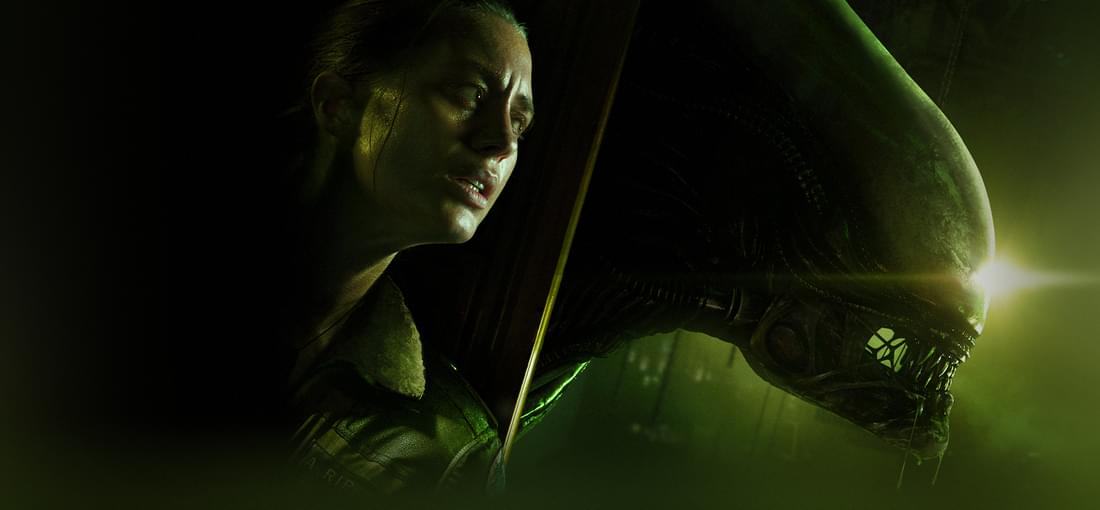
I love the Alien IP and really wanted to like this game, but I can't. First impressions were strong, thanks to the faithfully crafted assets: Your surroundings, the equipment etc. are a perfect fit for the franchise. There's a lot of cute fan service in here, too. Unfortunately neither the level design nor the gameplay hold up. Not only are rooms constantly re-used with only minor alterations, the entire progression is painfully linear with lots of backtracking through already visited areas. It's basically a never-ending corridor leading you from button to button, from contrived problem to script trigger. The entire game feels artificially lengthened to obscene degrees. The main gameplay loop is about stealth and sometimes combat, although neither are particularly interesting. There are some tools for distracting, stunning or killing enemies, but mostly it's just a waiting game. The vaunted xenomorphs are disappointing: A few scripted sequences can't plaster over the fact that these creatures are not really hunting you nor laying traps or ambushes, but simply patrolling an area, spawning from vents when there's too much noise (like gunfire or machinery) and de-spawning again when they get bored (or torched). Their AI seems to be surprisingly basic and path-finding is poor. They usually kill you by starting an instakill animation from a rather long distance, "sucking" you in, so timing is important for sending them away. Also, they aren't scary so much as annoying - especially when they cause you to lose progress since the last save-point, adding to the game's runtime and my annoyance. The same deal with unavoidable animations also happens with the android enemies (and the constantly repeated door-opening or tool-using animations). All of this gets old quick. The story is basic but serviceable. Honestly, I had far more fun with the rightfully panned Aliens: Colonial Marines. But if you want my actual recommendation, I'd say go play Aliens vs. Predator 2.
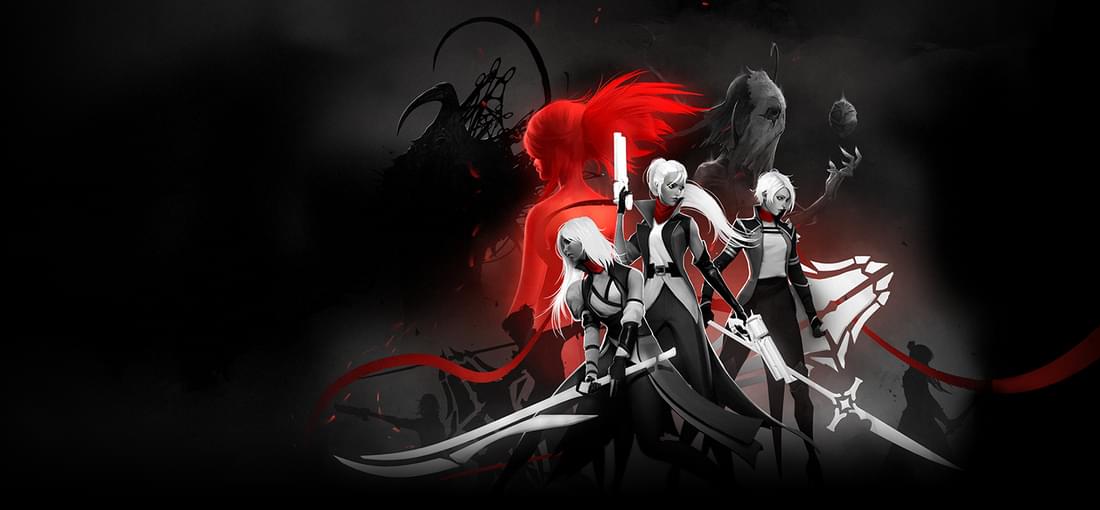
Initially, the visuals are the most striking part: Black and white, small blotches of colour (mostly red); some great monster and area designs, extremely fluid animations. The game likes to tell its story not just through dialogue, but also with the arenas you fight in. However, repetition of layouts becomes quite noticeable after a while; especially considering you'll be re-running some sections, as it's a Roguelite. Speaking of which, despite the blurb, this game is actually surprisingly forgiving when it comes to those mechanics: Yes, your Daughters can't be healed unless you sacrifice another one. Yes, they will eventually die. But not only can you resurrect them during your current run, the graveyard is persistent! This means that not only will you benefit from unlockable boosts on subsequent runs, you can also train up a cadre of powerful Daughters over time. This makes growing stronger much easier than I was expecting, but is also a source of some grinding. Speaking of Daughters: There are up to four different classes you can have, each with a number of mutually exclusive skills to choose from. Every skill can be equipped with looted upgrades (which are not persistent beyond death), if you have the currency for it. Additional variety comes from individually unlocked traits, which can be extremely powerful. So there's a lot of individuality to your Daughters (including names/looks, if you care to customize). The monsters come in a few categories, with dedicated melee, ranged, entangling, supporting, bruiser etc. types. Their variety and abilities are nice, although you will come across slightly modified, stronger variants of initial designs as you go deeper. A special mention must go to the great soundtrack, containing anything from haunting, strange melodies to power ballads, dynamically applied during gameplay. Overall a great experience, albeit a bit repetitive: It's a very nice game to pick up, do a few fights to progress, and put down again for a while.